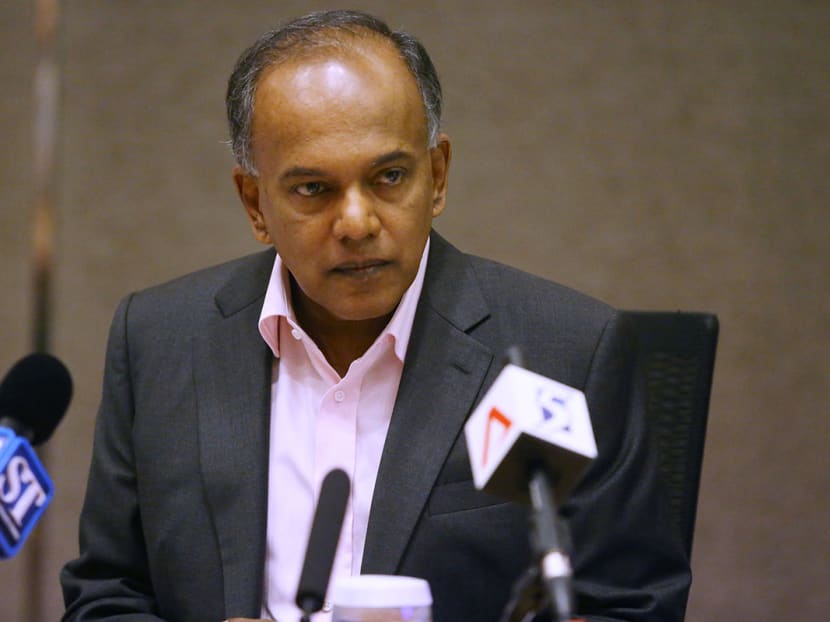Young suspects to be accompanied by trained volunteers to police interviews
SINGAPORE — From April, some young suspects will be accompanied by independent volunteers during police interviews, said the Ministry of Home Affairs (MHA), as it accepted recommendations following a multi-agency review on investigation processes for young people.

Mr K Shanmugam, Minister for Home Affairs and Minister for Law, attends a press conference on the review of the handling of young suspects under criminal investigation, at the Ministry of Home Affairs (MHA) on Jan 6, 2017. Photo: Koh Mui Fong/TODAY
SINGAPORE — From April, some young suspects will be accompanied by independent volunteers during police interviews, said the Ministry of Home Affairs (MHA), as it accepted recommendations following a multi-agency review on investigation processes for young people.
The Appropriate Adult Scheme for Young Suspects (AAYS) under the age of 16 will be piloted at Bedok Division, the Criminal Investigation Department and the Central Narcotics Bureau’s Investigation Division, before being launched islandwide by the middle of 2019.
Volunteers will be trained to spot signs of distress, provide emotional support and facilitate communication between the young person and the police — but will not advocate for the young person, provide legal advice or disrupt the course of justice.
But discretion will have to be exercised and exceptions will be made in certain cases, such as when time is of the essence, said Law and Home Affairs Minister K Shanmugam at a press conference yesterday announcing the move.
The new scheme builds on an existing Appropriate Adult Scheme for people with mental disabilities, which started two years ago.
The review, which comprised the Attorney-General’s Chambers (AGC), the MHA, the Education Ministry (MOE) and the Social and Family Development Ministry, stemmed from a public outcry over the suicide of 14-year-old Benjamin Lim in January last year, after he was questioned by the police for alleged molest.
A Coroner’s Court ruled last August that Benjamin’s fall from height was a deliberate act of suicide that could have resulted from issues with managing his anger and emotions, along with the stress of facing an investigation.
Yesterday, the MHA said that the review concluded that existing processes were sound and suggested adjustments to boost coordination among agencies.
“For example, there are improved processes for schools to provide police and Central Narcotics Bureau with relevant information to better understand the young suspect’s personal circumstances,” said the ministry.
A key recommendation was having the AAYS scheme. Between 2011 and 2015, the police arrested more than 7,000 young suspects for various offences. The general philosophy would be that every young person will be interviewed in the presence of an appropriate adult at the police station, although officers would have to exercise discretion, said Mr Shanmugam.
Exceptions include cases where time is a critical factor, and there is a risk of disposal of evidence. “Let’s say there’s a bunch of young boys — part of a gang — and there’s substantial damage. Or there are victims who are seriously injured or have died. It’s going to take time to get an AA for each of them and you need to talk to them quickly to prevent information flow and see who else was involved and pick them up quickly,” he said.
Turning to Benjamin’s suicide, Mr Shanmugam said he did not see anything in the State Coroner’s findings that suggested having an appropriate adult in his case would have helped. The
Coroner had ruled that police officers and school staff had handled Benjamin “sensitively”.
“(The AAYS) is a good thing to do to give comfort to the young person ... because regardless of how well the officer treats you, he’s still wearing a uniform. So having someone there who’s not part of the police may be helpful,” he said. “But to then say, ‘Would this have prevented suicide?’, I wouldn’t draw that conclusion.”
The MOE said that it would be implementing further measures to enhance support for students under investigation. For instance, if the student is picked up from school, a staff member familiar to the student — such as a teacher or counsellor — would accompany him in the police vehicle.
“The school will also keep in touch with the parent to work out follow-up steps to look after the young person’s well-being. This includes monitoring his or her well-being and making counselling support available,” said an MOE spokesman.
While they praised the new scheme, lawyers and social workers felt that the devil was in the details in practice.
Veteran criminal lawyer Amolat Singh pointed out that the appropriate adult could be activated before the interview at the police station. “There could be some shouting at the child in the car and he might already be shaken to the core. The key is to have the volunteer come in as early as possible.”
Mr Sunil Sudheesan, president of the Association of Criminal Lawyers of Singapore, added that clear guidelines on the young persons who should have access to an appropriate adult have to be set. “The key point is to make sure both sides are protected,” he said.
Fei Yue Community Services’ senior social worker Iris Lin felt that care had to be taken to explain to youths about the role of the appropriate adult, or the scheme may “backfire”. Training should also be given to the volunteers to ensure that they can communicate with youths and pick up unstable emotions.
Singapore Children’s Society’s Carol Balhetchet suggested that volunteer cops — from the Voluntary Special Constabulary — be tapped as a resource for the scheme, given that they are already familiar with laws.
The National Council of Social Service intends to announce the appointed organisation by next month.
To cost an estimated S$400,000 in the first year, the scheme will be co-funded by the Tote Board. An implementation committee led by the AGC has been set up.






